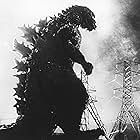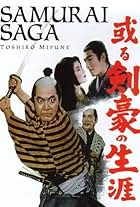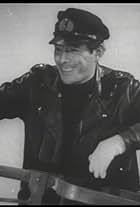Ajouter une intrigue dans votre langueJapanese Admiral Isoroku Yamamoto, a brilliant tactician, is a loyal subject of the emperor, despite his grave misgivings about leading Japan's navy into war with the United States. He oppos... Tout lireJapanese Admiral Isoroku Yamamoto, a brilliant tactician, is a loyal subject of the emperor, despite his grave misgivings about leading Japan's navy into war with the United States. He opposes the attack on Pearl Harbor, but overruled, leads his forces to the best of his ability.Japanese Admiral Isoroku Yamamoto, a brilliant tactician, is a loyal subject of the emperor, despite his grave misgivings about leading Japan's navy into war with the United States. He opposes the attack on Pearl Harbor, but overruled, leads his forces to the best of his ability.
- Réalisation
- Scénario
- Casting principal
Avis à la une
Directed by Ishiro Honda, destined for bigger things in the following year with Godzilla, the film is clearly treading a fine line in how it depicts the war. Opening with a thanks to the US military for providing stock footage the specter of not offending the US does seem to pervade many scenes but it also specifically states that it is operating from a basis of truth and for the most part it does seem that it gets enough right to let any minor historical inaccuracies slide, although the shots of P-40s being used in the sea battles of the Pacific may test the patience of aviation nerds.
Starring Kurosawa veteran Denjiro Okochi as Yamamoto, two other regulars also have small scenes with Takashi Shimura in a blink-and-you-miss-it segment and Toshiro Mifune as a torpedo plane pilot who is an early adopter of the kamikaze lifestyle. Honda uses a mix of combat footage, clever matte work and, of course, his beloved models to great effect, particularly in a shot of attack planes flying through a Hawaiian valley. While there are many (and I mean many) scenes of guys standing or sitting around some sort of table describing the action it did not bore and I found it fascinating from a historical perspective. It turns out that trusting rabid political and military nutjobs was not a prudent thing to do for Japan, there might be lessons in that yet.
The film actually begins with an interrogation of a leftist assassin who made an attempt on Yamamoto's (Denjiro Okochi) life. It's an interesting quick look at the makeup of the higher levels of Japanese government from the outside, but we spend the next twenty minutes or so as we watch the Prime Minister Konoe (Minoru Takada) try to form cabinets, keep them, and watch them dissolve over constant efforts to join the Tripartite Pact with Germany and Italy. All the while, Yamamoto has been given a small position off to the side, admired by his men, but waiting for his retirement until he's given command of the Combined Fleet.
The ideal for the Japanese people would stem from Yamamoto's combination of sense of duty to his superior officers, repeated resistance to the war (for non-political reasons, it should be noted), and strong performance during the war. Essentially, the Japanese people could never deny being part of the war, but they could always say that they both opposed it and served admirably and nobly at the same time. It's a serious concern for a country accused of rather heinous war crimes, especially in Manchuria. This sanded down look at one of the better men in Japanese command, who died in pursuit of loyal service to his emperor despite his misgivings about the practicality of the effort, is a strong vehicle for that kind of self-congratulation masked as biography.
Still, despite my theory for how the Japanese people would consume this product, and the suspicion that Yamamoto was probably a bit rougher than this in real life (his wife and children are never even mentioned), I think it's a strong effort at hagiography, history, and war movie all rolled into one.
The height of the film is Pearl Harbor. It's built up to rather exquisitely with Yamamoto outlining his overall strategy in the war that he has insisted would rope in America for years (his political opposition insisting that the entrance into the Tripartite Pact would be purely anti-Soviet and not involve Britain, France, or America), and how Japan was simply ill-equipped to deal with a long war with the far superior nation's military and industrial might. It has to be a quick strike followed by appeals for peace, hence the attack on Pearl Harbor, hopefully crippling American naval power in the Pacific for a long stretch to give Japan bargaining power. All of this is very clearly laid out, and Honda does some very good use of miniatures to portray the battle, providing a surprising painterly quality to the action on screen. It should also be noted that there is a grand one American face in the whole film (a pilot at the Battle of Midway), Honda and his screenwriter Shinobu Hashimoto feeling no need to provide other perspectives. This is a Japanese story, through and through, and I appreciate that.
The focus on Midway is probably the film's biggest issue. The portrait of the battle itself is actually quite good, emphasizing the confusion and paralysis that the lower commanders experienced as the plan that Yamamoto had laid out gets called into question because of facts on the ground (namely stemming from a call from a flight commander for a second bombing run on Midway Island itself). However, the problem is that Yamamoto is barely part of it. He sits in his command center on the Yamato as things collapse far from him, mostly without his knowledge. The Battle of Midway is an important biographical element to Yamamoto's life, but he honestly didn't have much to do with the battle as it was actually fought. Pearl Harbor happened according to plan. Midway didn't, so the plan becomes less important to the telling, putting the focus more firmly on the lower commanders who did make the decisions that day.
Anyway, the film ends nostalgically and quietly as Yamamoto marches straight towards his own death, a combination of what seem to be orders to end his own life and the American effort to use their knowledge of Japanese codes to take out one of Japan's most valuable battle commanders.
So, I found the portrait very compelling, save for the Battle of Midway because Yamamoto was pushed to the side for a long stretch of the film as events played out without his involvement. Other than that, it's a compelling look at a good man. Whether the film actually aligns with how the man actually was in history is not for me to say. I imagine it's knee deep in the truth, at least. Still, I was involved. It looks good. It's well acted (Toshiro Mifune has a small role as a pilot, which is nice to see). The miniature work is quite well done. It's really quite good.
Le saviez-vous
- ConnexionsEdited from Les Volontaires de la Mort (1942)
Meilleurs choix
Détails
- Date de sortie
- Pays d’origine
- Langue
- Aussi connu sous le nom de
- Operation Kamikaze
- Société de production
- Voir plus de crédits d'entreprise sur IMDbPro
- Durée1 heure 59 minutes
- Couleur
- Mixage
- Rapport de forme
- 1.37 : 1
Contribuer à cette page





























